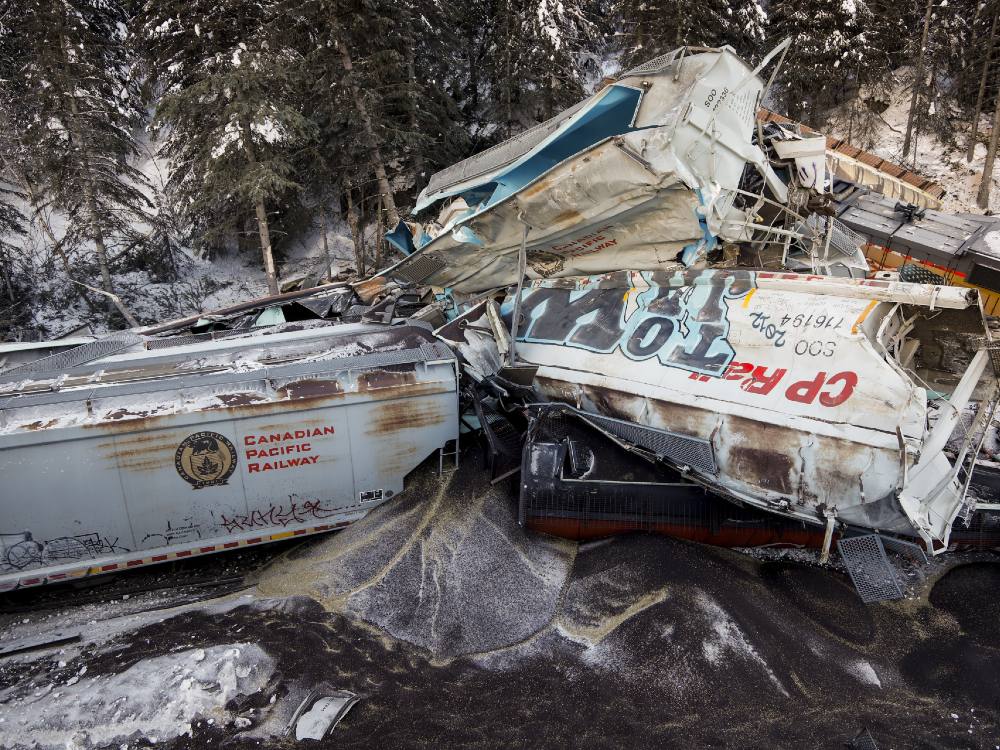Major railways in Canada, alone among private sector corporations, have their own police forces with full investigative and jurisdictional powers over accidents on, or near, their property.
These unique powers — a historic anomaly dating back to the 19th century when railways were being built across North America — have, until recently, escaped public scrutiny.
Investigators answer to their own police chiefs at the railways, and ultimately to corporation executives, for whom profit and shareholder value are paramount. The closest parallel is military police whose law enforcement investigations are not independent but accountable to their military command structures.
The crash in Field
Public awareness of the powers of railway police forces has grown in the wake of a runaway Canadian Pacific freight train crash near Field, B.C., in February 2019, which killed three workers.
The CP police investigation into the accident focused on the crew’s actions. It didn’t examine potential fault by the corporation. No details of the investigation’s findings were made public.
However, one of the CP police investigators assigned to the accident spoke out. Mark Tataryn told CBC’s The Fifth Estate that his superiors ordered him to stop investigating and prevented him from obtaining key records such as maintenance, safety and inspection reports. He alleged there was a coverup of potential negligence by the company.
Documents obtained by The Fifth Estate also revealed that CP Rail threatened the Transportation Safety Board with a lawsuit after its lead investigator, Don Crawford, told CBC News, “There is enough to suspect there’s negligence here, and it needs to be investigated by the proper authority.”
The TSB removed Crawford from the investigation on the grounds his statement was inappropriate, since the TSB does not have the authority to determine criminality.
The TSB can refer cases to the RCMP
However, a memorandum of understanding between the RCMP and the TSB signed in 2015 outlined a policy of referring to the RCMP “occurrences in which there are indications of possible criminal activity.”
That means the TSB was within its rights to refer the case to an authority that could investigate criminal liability. A 2020 amended version of the memorandum removed the reference to potential criminality.
Finally, in December 2020 — and only after intense media attention and complaints from the dead crew’s family — the RCMP opened a criminal investigation into the crash, which is ongoing.
CP executives and police continue to deny any wrongdoing.
Canada’s Railway Safety Act is silent on how Canadian railway police should be governed and who their ultimate boss is. But they should be governed first and foremost by the law and their duty to uphold the public interest.
However, the law is murky. Railway police forces are paid by the corporation, giving its CEO ultimate control. That means the railway police chiefs follow corporate directives.
Presumably, this would also apply to CN and CP police chiefs operating in the United States, who, while not commissioned police officers in any American state, are ultimately accountable to corporate CEOs based in Canada.
Canadian bosses for US railways
U.S. railway policing powers, also dating back to the 19th century, are broadly comparable to those of their Canadian counterparts. The U.S. has a state-based system, with most states having similar levels of railway police powers.
The American federal government has a modest degree of oversight legislation in place. But U.S. railway police forces answer to the chief security officer of the corporation, whose specific job description prioritizes protecting the corporation and its reputation.
However, several sources have indicated to me that this practice has existed for so long that it has most likely slipped under the radar of American authorities. They have likely not considered the implications of CN and CP police chiefs — and indirectly their corporate bosses — exercising police powers in the U.S.
This relationship has recently gained public attention because of CP’s pending takeover of Kansas City Southern, which is currently under review by the U.S. Surface Transportation Board.
Calls for action
The CP investigation into the Field, B.C., crash and other railway accidents have led to demands — from within government itself, railway unions and the public — to dismantle existing railway police powers.
A recent House of Commons Transport and Infrastructure Committee report recommended eliminating company policing power provisions from the Railway Safety Act to avert potential conflicts of interest when private railway police investigate their own companies.
The Teamsters Canada Rail Conference, Canada’s largest railway union, is calling for the total abolition of railway police.
Several parliamentary petitions, including one filed by the mother of one of the Field victims, are calling for existing railway police to be brought under one independent public railway police regime, funded by the companies and accountable to an independent civilian oversight commission, similar to the British system.
The families are also suing CP Rail and Transport Canada.
The government was obliged to respond to the parliamentary petitions after Parliament resumed on Sept. 19, 2022. But so far the prime minister, the attorney general and the transport minister have yet to address calls for railway policing reform.
Under current railway police powers, the families of dead railway workers are left with no answers and no accountability. Railway corporations are never properly investigated, let alone held to account for failings that contribute to these industrial workplace tragedies.
The time to act is long overdue. The federal government must replace this antiquated relic with a railway policing law that helps restore public confidence in law enforcement and provides justice to victims’ families.![]()
![]()
Read more: Rights + Justice, Transportation, Labour + Industry
















Tyee Commenting Guidelines
Comments that violate guidelines risk being deleted, and violations may result in a temporary or permanent user ban. Maintain the spirit of good conversation to stay in the discussion.
*Please note The Tyee is not a forum for spreading misinformation about COVID-19, denying its existence or minimizing its risk to public health.
Do:
Do not: